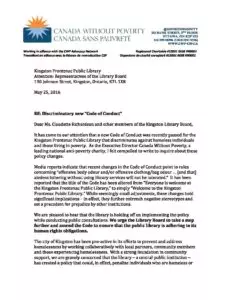UPDATE: On May 25, 2016, CWP’s Executive Director, Leilani Farha, wrote to the Kingston Library Board expressing our concerns with the Kingston Library Code of Conduct.
Read what she wrote by clicking on the image below: Pushed Out: Discrimination in Ontario’s Public Libraries
In Canada, the approximately 35,000 people who are homeless on any given night face incredible barriers. For some, the largest struggle is finding a safe place to sleep for the night. One commonly overlooked daily hurdle for the homeless is how to spend their time during the day when they have nowhere else to go. In the absence of long-term solutions, one common place of refuge during the day for those battling the extremes of Canada’s climate is the local public library.
Recently these sanctuaries have been coming under fire from new oppressive policies aimed at ridding themselves of “unwanted patrons.” In particular, libraries across Ontario have recently been criticized for implementing new policies that clearly discriminate against individuals who are seen as “unkempt and/or odorous.”
Most notably the Kingston Public Library’s new updated code of conduct has been brought forward for community consultation after allegations of the policy’s deliberate mandate against those who are homeless. The code’s headline has even changed from “Everyone is welcome at the Kingston Frontenac Public Library,” to simply “Welcome to theKingston Frontenac Public Library.” This small change comes with significant implications of exclusion and discrimination. This mentality is supported by statements such as “Offensive body odour and/or offensive clothing/bag odour … [and] aimless loitering without using library services will not be tolerated.”
These regulations, consequently, force an already marginalised population – the homeless – out of yet another public space.
What are the consequences?
The banishment of those who are homeless from public libraries due to odour and perceived vagrancy is a blatant violation of their dignity and human rights. During extreme weather conditions it is, not only uncomfortable, but often dangerous.
In Toronto alone, it is estimated that 740 homeless individuals have perished suddenly since 1985. These numbers are reported by the Homeless Memorial project, who recognize the barriers to fully track all of the homeless deaths within the city. These numbersare not all caused by extreme weather though once the weather reaches extremely low temperatures deaths start to increase. This was marked by three deaths within one extremely cold week in January of 2015. In a city with such a significant number of homeless individuals dying from exposure, you would think that the Toronto Public Library system would welcome them with open arms. However, their code of conduct still clearly stipulates that “appropriate attire” must be worn to access services.
In addition to extreme cold snaps, Canada also has scorching heat waves in the summertime. This is especially true in Ontario where the humidex reaches over 40 degrees at least once a year. These temperatures cause overcrowding in shelters which increases the amount of homeless individuals seeking shelter in public libraries. If these people are denied access due to appearance, odour, and/or loitering they are put at severe risk of the various negative health implications of extreme heat exposure and dehydration.
What can be done?
Halifax Public Libraries have been credited with being the first to answer the “out of the cold call.” These facilities welcome any and all people to use their services, especially in extreme weather conditions. Many anecdotes from homeless individuals who have used the libraries attest to the kindness and warmth they felt from the staff and volunteers there.
The motto of the Halifax facilities centres on the concept that their services can, not only, save individuals from frigid conditions, but also can support the dignity of those who are forced to live on the streets.

There is no question that Canada needs long term solutions for individuals who face the cold realities of street life every night. The success of any strategy to end homelessness depends on the immediate elimination of discriminatory policies which perpetuate stigma.
Library policies which aim to exclude those living with homelessness are a precise example of this deep-seated prejudice against those who are the most marginalized in our communities. Everyone deserves a space to rest overnight – but we have to go further and recognize that the need for dignity and safety doesn’t disappear when the sun comes up.
Filip Szadurski is a Carleton BSW Student.
Canada Without Poverty is a non-partisan, not-for-profit, charitable organization dedicated to the elimination of poverty in Canada. CWP is here because of your support. We would not be able to continue our work in eliminating poverty without your help. Please consider making a donation to CWP to support our work in ending poverty for everyone in Canada.


